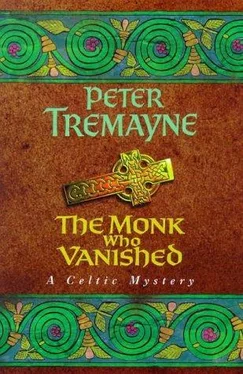Peter Tremayne - The Monk Who Vanished
Здесь есть возможность читать онлайн «Peter Tremayne - The Monk Who Vanished» весь текст электронной книги совершенно бесплатно (целиком полную версию без сокращений). В некоторых случаях можно слушать аудио, скачать через торрент в формате fb2 и присутствует краткое содержание. Жанр: Исторический детектив, на английском языке. Описание произведения, (предисловие) а так же отзывы посетителей доступны на портале библиотеки ЛибКат.
- Название:The Monk Who Vanished
- Автор:
- Жанр:
- Год:неизвестен
- ISBN:нет данных
- Рейтинг книги:3 / 5. Голосов: 1
-
Избранное:Добавить в избранное
- Отзывы:
-
Ваша оценка:
- 60
- 1
- 2
- 3
- 4
- 5
The Monk Who Vanished: краткое содержание, описание и аннотация
Предлагаем к чтению аннотацию, описание, краткое содержание или предисловие (зависит от того, что написал сам автор книги «The Monk Who Vanished»). Если вы не нашли необходимую информацию о книге — напишите в комментариях, мы постараемся отыскать её.
The Monk Who Vanished — читать онлайн бесплатно полную книгу (весь текст) целиком
Ниже представлен текст книги, разбитый по страницам. Система сохранения места последней прочитанной страницы, позволяет с удобством читать онлайн бесплатно книгу «The Monk Who Vanished», без необходимости каждый раз заново искать на чём Вы остановились. Поставьте закладку, и сможете в любой момент перейти на страницу, на которой закончили чтение.
Интервал:
Закладка:
‘I will survive, I suppose. There are others of our township who will not. We shall see what we can recover from the ashes.’
Finguine shook his head sadly. ‘It will take a while to restore your forge,’ he observed. ‘A pity. It was only the other day that I thought to prevail on your craftsmanship and commission you to make me another of these silver brooches.’ He fingered the brooch on his cloak absently. Then he noticed Nion’s injury. ‘Were you badly wounded?’
‘Bad enough,’ Nion replied. ‘And I shall not be earning a living as a smith for a while yet.’
‘Were you here when the raid began?’ Fidelma intervened for the first time.
‘I was.’
‘Can you describe exactly what happened?’
‘Little to tell, lady,’ he said ruefully. ‘I was awakened by the clamour of the attack. I was asleep at the back of my forge. I ran out and saw upwards of a score of men riding through the streets. Cred’s tavern was already in flames. People were running hither and thither. I could not recognise who the attackers were; just that they were intent on burning the town. So I grabbed a sword from those I had been sharpening. I had my duty as bó-aire. I ran out, determined to save my forge and the town but — the cowards! — I was struck from behind. As I fell, another attacker speared me in the leg. Then the flames were eating at the forge. My assistant, Suibne, dragged me away and we took shelter.’ He glanced, embarrassed, at Finguine. ‘Although I am bó-aire, and it is my task to protect my people, I am not expected to commit suicide. There were no warriors here and none who could help me drive off the attack.’
‘You did not recognise the attackers? You do not know who they were or where they were from?’ pressed Finguine.
‘They rode from the north and returned to the north.’ The smith spat on the floor. ‘There is little need to ask who they were.’
‘But you do not know who they were for certain?’ insisted Fidelma.
‘Who else could they be but Dal gCais? Who else but the murdering Uí Fidgente would make such an attack on Imleach and destroy the great yew?’
‘But you do not know for sure?’ she stressed once again.
The smith’s eyes narrowed in unconcealed anger. ‘Next time I meet an Uí Fidgente I will not need proof before I slaughter him. If I am wrong, I am prepared to go to hell just for the pleasure of taking one Uí Fidgente with me! Look what they havedone to my township.’ He flung out his arm expressively to the smouldering ruins.
Finguine turned with a serious look to his cousin. ‘It is true that most of the people feel like this, cousin. Indeed, who else can it be but the Uí Fidgente?’
Fidelma drew him and Eadulf out of earshot of Nion, away from the forge.
‘This is precisely what I need to find out,’ she said. ‘If it is the Uí Fidgente, so be it. But we must be sure. Donennach of the Uí Fidgente stays currently in Cashel to conduct a treaty with my brother. He and my brother were wounded in an attempted assassination. In a few days there will be a hearing in which we must prove Uí Fidgente duplicity or be held up before all the five kingdoms of Eireann as the aggressors. I do not want theories, I need proof of their involvement.’
Finguine was sympathetic. ‘It was a pity someone took vengeance on your captive. We might have been able to learn something from him.’
‘I wonder if vengeance was the motive to stab him in the heart and dispatch him so quickly and silently?’ Fidelma said the words absently as if pondering the matter.
Finguine and Eadulf regarded her with surprise.
‘I am not sure what you are implying?’ the Prince of Cnoc Aine said hesitantly.
‘My implication is simple enough,’ she responded.
‘Do you think that he was murdered to prevent him revealing the identity of the attackers?’ Eadulf had more quickly understood the implication of what she had said.
Fidelma’s expression told him that he was correct.
Eadulf’s mind worked quickly. ‘But that would mean … surely, that would mean that a member of the abbey was working hand in glove with the raiders?’
Fidelma shook her head at his tone of incredulity.
‘Or someone in the abbey,’ she corrected. ‘Is that so difficult to believe? Every strand of this mystery leads to this abbey.’
Eadulf raised a hand and tugged at his ear thoughtfully.
‘I am casting my mind back. We left the warrior trussed up and went into the tower. Was he still alive when we came down, having heard the approach of Finguine? I cannot vouch for it.’
‘Nor I,’ confirmed Fidelma. ‘Was he killed when we were in the tower or was he killed when we opened the gate and came out to greet Finguine?’
‘Well, if he had been killed when we were in the tower, there were several brethren still in the courtyard by the gates. There werethose involved in removing the bodies of Cred and Brother Daig to the mortuary and in helping Brother Madagan to his chamber.’
Fidelma was reflective.
‘When we returned to open the gates, Brother Tomar was there with the Abbot Ségdae. There were a couple of other Brothers standing nearby. We hurriedly opened the gate and came out to greet Finguine. Someone could easily have stabbed the man during that time.’
‘There was certainly time to kill him and any one of the brethren could have been responsible.’ Eadulf sighed.
‘That does not help me much, cousin, to identify the raiders,’ interrupted Finguine. ‘A dead man can’t tell tales.’
Fidelma looked at her cousin for a moment and then smiled knowingly. ‘Sometimes a dead man can reveal much,’ she replied solemnly. ‘As the dead warrior is the only evidence we have of the raiders, I think we should go and examine him and his belongings. There might be a clue on him.’
They were turning back to the abbey when one of Finguine’s men, who had been examining the fallen yew-tree, came hurrying across and whispered urgently to the Prince. Finguine turned to them with a smile of triumph.
‘I think that we have the confirmation we need to apportion blame,’ he announced with satisfaction. ‘Come.’
They followed the man to the yew-tree. He stood aside and pointed to part of the unburnt wood, to something engraved on the fallen trunk. It was a symbol, a crude carving of a boar.
‘The emblem of the Prince of the Uí Fidgente.’ Finguine did not have to explain.
Fidelma regarded it for a moment.
‘It is interesting that, during what was a stealthy night attack, someone went to great pains to let us know who the attackers were,’ she mused.
At that moment a clear note on a trumpet sounded.
It was Finguine’s men returning, those whom he had sent to chase the raiders.
They came riding into the township, their horses dusty and tired. Their leader saw Finguine and rode over, halting and sliding from his mount. Even as his feet touched the ground he was shaking his head in disgust.
‘Nothing,’ he growled angrily. ‘We lost them.’
Finguine frowned in displeasure. ‘Lost them? How?’
‘They crossed a river and we lost their tracks.’
‘Which way were they going when you lost contact with them?’ asked the Prince of Cnoc Aine.
‘North, veering towards the mountains, I would say. But we lost their tracks in the Dead River. They could have turned in any direction from there. I believe that they continued north.’
‘Didn’t you scour the north bank to find out where they left the river?’ demanded Finguine.
‘We rode a mile or so in both directions in order to pick up their tracks but we were unable to do so. There was a lot of stony ground there.’ The man sounded bitter at his Prince’s rebuke.
Читать дальшеИнтервал:
Закладка:
Похожие книги на «The Monk Who Vanished»
Представляем Вашему вниманию похожие книги на «The Monk Who Vanished» списком для выбора. Мы отобрали схожую по названию и смыслу литературу в надежде предоставить читателям больше вариантов отыскать новые, интересные, ещё непрочитанные произведения.
Обсуждение, отзывы о книге «The Monk Who Vanished» и просто собственные мнения читателей. Оставьте ваши комментарии, напишите, что Вы думаете о произведении, его смысле или главных героях. Укажите что конкретно понравилось, а что нет, и почему Вы так считаете.












